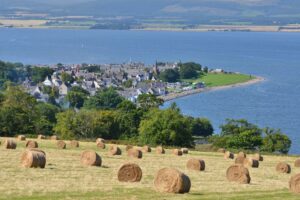 The EEHN PhD Lab members have been awarded a second University of Edinburgh Student Experience Grant to run a retreat. This year, they will be organising Tidal Movements in Environmental Humanities in Cromarty on the Black Isle peninsula in northern Scotland to take place this May.
The EEHN PhD Lab members have been awarded a second University of Edinburgh Student Experience Grant to run a retreat. This year, they will be organising Tidal Movements in Environmental Humanities in Cromarty on the Black Isle peninsula in northern Scotland to take place this May.
The 3-day residential retreat will bring together doctoral researchers within and outside the University working in the Environmental Humanities. The seaside location offers researchers the opportunity to work in collaboration with each other and the surrounding seascape.
This year we will be convening at the Cromarty Arts Trust. This venue, located right along the shore, was originally built as a brewery in 1776 and reopened in 1988 as an art centre. The weekend aims to build upon the learnings from the retreat last year at Cove Park, where a range of disciplinaries came together to discuss human and more-than-human relations working within and with the surrounding ecological landscape. We look forward this weekend of coming together to challenge our understandings of Environmental Humanities and the impact we can have on the wider public. We will engage in site-specific fieldwork along the shore and engage in tidal-timed discussions working to redefine Environmental Humanities in our current climate crisis.
The workshops during the retreat will build research skills and networks that will provide important opportunities for students to share their current research in an encouraging peer-support environment. In addition to group workshops on Tidal Movements, we will honour space for the individual research projects of each participant. We hope to glean a deeper understanding of each other and our respective fields.
Outcomes from this retreat will be developed later into a panel discussion to be presented at the ASLE-UK Conference this September. In addition, the retreat aims to provide a space for workshop development to be used with master’s students on the Environment, Culture and Society Geosciences course and the Architecture, Landscape and Environment course based in ECA. In this way, we aim to continue to contribute significantly, not only to the Environmental Humanities, but to the University’s cross-disciplinary research community as a whole.
Congratulations to all the team that work on this including Matthew Lear, Ciara Bolton, Eszter Erdosi, Keili Koppel, Ellie Bush, Hannah Duffew, Felix Clarke and Annie Gallagher.
Written by: Annie Gallagher



